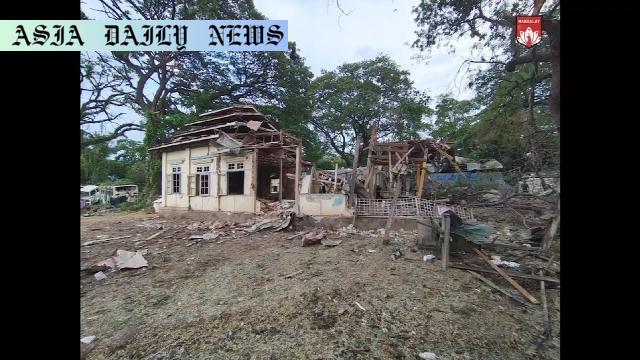Myanmar military has bombed pro-democracy areas, killing civilians. Junta aims to control unrest before elections under lifted emergency.
- Myanmar military carries out deadly airstrikes after lifting emergency.
- Over 30 civilians killed as junta targets pro-democracy forces.
- Emergency reinstated in conflict zones, elections in December draw criticism.

Myanmar Military Airstrikes Leave Over 30 Dead
The Myanmar military has intensified its violent tactics, targeting pro-democracy areas with deadly airstrikes just days after lifting the state of emergency. Reports from local independent outlets indicate that these aggressive operations have already resulted in the deaths of over 30 individuals, including civilians. Among the most devastating attacks was an airstrike on two villages within the Mandalay Region last Tuesday, killing 24 residents and injuring 30 others. This was followed by similar brutal strikes on Saturday, which left at least 12 people dead. The recurrence of such atrocities underscores the intensification of the junta’s strategy to suppress opposition forces, regardless of the collateral damage inflicted on civilians.
Junta’s State of Emergency and Election Strategy
On Thursday, the military junta announced the lifting of the nationwide state of emergency, a move tied to its preparations for a general election scheduled for December. However, the situation remains far from stable. Fighting continues in several regions, prompting the junta to promptly reimpose the emergency in conflict-affected areas. This act reveals an underlying strategy to consolidate power while attempting to present an image of moving toward normalization through an election. Opposition forces, however, have dismissed such efforts, labeling any election orchestrated by the junta as fundamentally illegitimate due to their ongoing authoritarian control.
Civilians Bear the Brunt of a Ruthless Regime
The escalation of violence by the Myanmar military exposes the severe plight of ordinary citizens trapped in conflict zones. Rather than ensuring safety and stability, the junta’s actions have led to widespread destruction and civilian casualties. Individuals residing in targeted areas live in a constant state of fear, with little hope for immediate relief. The international community has largely condemned the Myanmar military for its disregard for human rights, but effective measures to halt these atrocities remain elusive. Despite the junta’s claims of restoring order, its methods only deepen the divide and exacerbate the humanitarian crisis.
Global Reactions to the Junta’s Actions
The Myanmar coup has continued to attract widespread criticism and calls for accountability on an international scale. The lifting of the emergency and subsequent imposition of military control in selective areas has been recognized as a strategic overture to maintain authoritarian rule while legitimizing questionable elections. Global organizations and rights groups have emphasized the need for stronger, united measures to address the crisis. However, geopolitical complexities and diverse international interests in the region often slow decisive actions against the junta, leaving the pro-democracy opposition largely unsupported in its struggle.
The Path Forward: Challenges and Uncertainties
The prospect of elections in December has done little to inspire optimism regarding Myanmar’s future. Genuine democratic progress appears unattainable under the current regime, as it prioritizes self-preservation over meaningful reform. The lifting and reimposing of emergency laws reflect a tactically calculated, rather than principled, governance approach. Without a comprehensive international response and mechanisms to support local pro-democracy movements, the people’s hopes for freedom and justice remain distant. Myanmar is at a critical crossroads, and enduring peace will require unprecedented unity among its citizens and support from the global community.



Commentary
Myanmar’s Crisis: A Reflection of Suppression and Struggle
The recent developments in Myanmar paint a grim picture of a country caught in the vice grip of military authoritarianism. The junta’s decision to launch deadly airstrikes on civilian areas shortly after the state of emergency was lifted demonstrates a blatant disregard for human life and democratic principles. While the world struggles to hold the junta accountable, it is the ordinary citizens who face the devastating consequences of power struggles between the military and pro-democracy forces.
The timing of the junta’s announcement to lift the emergency and its push for elections in December warrants closer scrutiny. On the surface, it may appear as a step toward normalcy and governance. However, this maneuver seems to be a calculated effort to solidify power while minimizing international backlash. By reinstating the emergency in areas experiencing unrest, the regime sends a clear message of control, further marginalizing voices of dissent. Any election under such circumstances is unlikely to reflect the genuine wishes of Myanmar’s people.
What has been particularly heartbreaking is the suffering of civilians repeatedly caught in crossfire. The high death toll, including those from last week’s airstrikes, underscores the dire state of human rights violations in Myanmar. The international community must prioritize this crisis, recognizing that inaction allows such regimes to operate with impunity. Proactive measures, such as imposing tighter sanctions and providing tangible support for opposition groups, could alter the trajectory of the nation.
The road to democracy in Myanmar remains treacherous, littered with challenges posed by a deeply entrenched military regime. The resilience of its citizens, however, continues to be a beacon of hope. By amplifying their voices and responding with concrete international solidarity, there lies a chance to dismantle the junta’s stranglehold, ushering in a new era of freedom and progress.